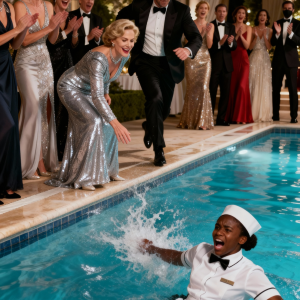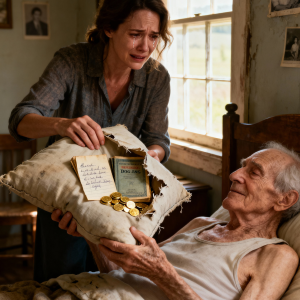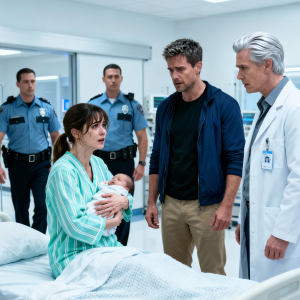
Nine-year-old Caleb Whitman was running late for school again. His sneakers slapped the pavement as he cut across the Riverside Plaza parking lot, hoping to shave off a few minutes. His teacher, Mr. Lawson, had warned him the day before that another tardy slip meant a call home, and Caleb dreaded disappointing his parents once more.
But halfway across the lot, something made him stop short. In a dark blue hatchback, parked directly under the sun, a small baby sat strapped in a car seat. The child’s cheeks were crimson, his mouth opening and closing in desperate cries that barely carried through the sealed glass. Droplets of sweat clung to his temples.
Caleb pressed his face to the window, knocking with his knuckles. No adult appeared. He tugged at the handles on each door, one after another, but every lock held firm. His pulse quickened as the infant’s wails weakened into short, raspy sounds.
The plaza was strangely quiet. A few shopping carts rolled in the breeze, but no shoppers were near. School was just three blocks away, yet the thought of abandoning the baby gnawed at Caleb’s stomach. He understood enough to know that waiting could be fatal.
On the edge of the sidewalk, he spotted a loose chunk of concrete. His hands trembled as he lifted it, whispering, “I’m sorry,” as though apologizing to the car itself. With all the strength his small arms could muster, he hurled it at the side window. The first strike only cracked it, but two more blows finally splintered the glass into shards.
Reaching carefully inside, Caleb unbuckled the sticky straps and lifted the infant out. The baby’s body was limp and clammy against his chest. Caleb rocked gently, murmuring, “It’s all right. You’re okay now.”
Just then, a startled voice rang out behind him. “What are you doing to my car?”

Caleb spun around. A woman rushed toward them, dropping two paper bags that split open across the asphalt. For a moment she looked furious at the broken window and the boy clutching her child. Then realization struck. Her anger dissolved into horror as she scooped the baby close, showering his damp face with frantic kisses. Tears filled her eyes as she whispered, “You saved him. I thought I’d only be a few minutes. I can’t believe what I’ve done. Thank you, thank you.”
Caleb didn’t know how to answer. In the distance, the school bell chimed, reminding him he was late yet again. He turned and sprinted the rest of the way, hands nicked from the glass, heart pounding with adrenaline.
When he burst into his classroom, Mr. Lawson’s stern gaze met him. “Caleb Whitman,” the teacher said, his voice sharp, “late again.”
All eyes in the room landed on him. Caleb opened his mouth to explain, then hesitated. The story sounded impossible. Who would believe he had smashed open a car to save a baby? He lowered his head. “I’m sorry, sir.”
“That’s not good enough,” Mr. Lawson replied. “This afternoon, I’ll be calling your parents. You need to learn responsibility.”
Caleb slid into his seat, cheeks burning, listening as a few classmates snickered. He stared at his stinging palms, wondering if he had made a terrible mistake. At recess, whispers followed him. Some kids joked about how he could never show up on time. Caleb stayed silent, his thoughts circling back to the baby’s flushed face. He knew, deep down, he would do it all over again.
What Caleb didn’t realize was that the woman from the parking lot had traced his steps to the school.
That afternoon, just before dismissal, the classroom door opened. The principal walked in, followed by the woman holding her now-sleeping baby against her shoulder. The room fell silent.
“Mr. Lawson,” the principal said, “this parent has something important to share.”

The woman stepped forward, her voice trembling. “Your student saved my child’s life this morning. I made the terrible mistake of leaving him in the car. When I came back, Caleb had already broken the window and rescued him. Without that, I don’t know what would have happened.”
Gasps rippled across the room. Every head turned toward Caleb, whose face flushed again, though this time with surprise.
Mr. Lawson’s eyes softened. “Caleb, why didn’t you tell me?”
He swallowed hard. “I thought you wouldn’t believe me.”
For the first time that year, the teacher crouched to Caleb’s level and rested a hand on his shoulder. “You showed bravery most adults would hesitate to find. I’m proud of you.”
The class erupted in applause. Some children even shouted his name with admiration. Caleb blinked back tears, a shy smile breaking across his face.
The woman leaned down and kissed the top of his head. “You will always be part of our family’s story,” she whispered. “We’ll never forget what you did.”
That evening, when the phone finally rang, it wasn’t a scolding call but a message of pride. Caleb’s parents hugged him tightly, telling him how honored they were to be raising a boy like him.
And as Caleb drifted to sleep, he understood something he hadn’t before. Being late might earn him scoldings at school, but when it mattered most, he had been right on time.



